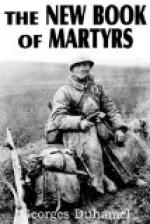One more glance into the dark ward, in which something begins to reign which is not sleep, but merely a kind of nocturnal stupor.
The billiard-table has been pushed into a corner; it is loaded with an incoherent mass of linen, bottles, and articles of furniture. A smell of soup and excrements circulates between the stretchers, and seems to insult the slender onyx vases that surmount the cabinet.
And now, quickly! quickly! Let us escape on tiptoe into the open air.
The night is clear and cold, without a breath of wind: a vast block of transparent ice between the snow and the stars. Will it suffice to cleanse throat and lungs, nauseated by the close effluvium of suppurating wounds?
The snow clings and balls under our sabots. How good it would be to have a game. ... But we are overwhelmed by a fatigue that has become a kind of exasperation. We will go to the end of the lawn.
Here is the great trench in which the refuse of the dressing-ward, all the residuum of infection, steams and rots. Further on we come to the musical pines, which Dalcour the miner visits every night, lantern in hand, to catch sparrows, Dalcour, the formidable Zouave, whom no one can persuade not to carry about his stiff leg and the gaping wound in his bandaged skull in the rain.
Let us go as far as the wall of the graveyard, which time has caused to swell like a protuberance on the side of the park, and which is so providentially close at hand.
The old Chateau looms, a stately mass, through the shadows. To-night, lamps are gleaming softly in every window. It looks like a silent, illuminated ship, the prow of which is cutting through an ice-bank. Nothing emerges from it but this quiet light. Nothing reveals the nature of its terrible freight.
We know that in every room, in every storey, on the level of every floor, young mutilated bodies are ranged side by side. A hundred hearts send the over-heated blood in swift pulsations towards the suffering limbs. Through all these bodies the projectile in its furious course made its way, crushing delicate mechanisms, rending the precious organs which make us take pleasure in walking, breathing, drinking....
Up there, this innocent joy of order no longer exists; and in order to recapture it, a hundred bodies are performing labours so slow and hard that they call forth tears and sighs from the strongest.
But how the murmurs of this centre of suffering are muffled by the walls! How silently and darkly it broods in space!
Like a dressing on a large inflamed wound, the Chateau covers its contents closely, and one sees nothing but these lamps, just such lamps as might illuminate a studious solitude, or a conversation between intimate friends at evening, or a love lost in self-contemplation.
We are now walking through thickets of spindle-wood, resplendent under the snow, and the indifference of these living things to the monstrous misery round them makes the impotent soul that is strangling me seem odious and even ridiculous to me. In spite of all protestations of sympathy, the mortal must always suffer alone in his flesh, and this indeed is why war is possible. ...




